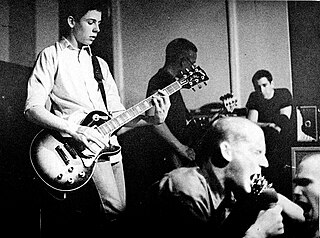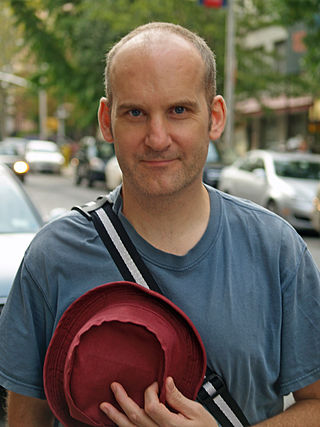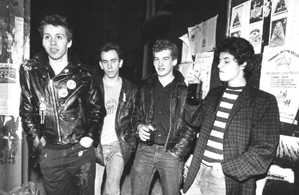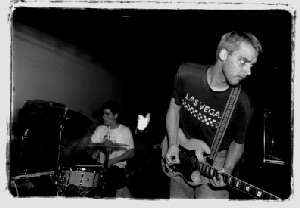Related Research Articles

Minor Threat was an American hardcore punk band, formed in 1980 in Washington, D.C., by vocalist Ian MacKaye and drummer Jeff Nelson. MacKaye and Nelson had played in several other bands together, and recruited bassist Brian Baker and guitarist Lyle Preslar to form Minor Threat. They added a fifth member, Steve Hansgen, in 1982, playing bass, while Baker switched to second guitar.

Ian Thomas Garner MacKaye is an American musician. Active since 1979, he is best known as the co-founder and owner of Dischord Records, a Washington, D.C.-based independent record label and the frontman of hardcore punk band Minor Threat and post-hardcore band Fugazi. MacKaye was also the frontman for the short-lived bands the Teen Idles, Embrace, and Pailhead, a collaboration with the band Ministry. MacKaye is a member of The Evens, a two-piece indie rock group he formed with his wife Amy Farina in 2001 and in 2018 formed the band Coriky with Farina and his Fugazi band mate Joe Lally.

Dischord Records is a Washington, D.C.-based independent record label specializing in punk rock. The label is co-owned by Ian MacKaye and Jeff Nelson, who founded Dischord in 1980 to release Minor Disturbance by their band The Teen Idles. With other independent American labels such as Twin/Tone, Touch and Go Records, and SST Records, Dischord helped to spearhead the nationwide network of underground bands that formed the 1980s indie rock scene. These labels presided over the shift from the hardcore punk that then dominated the American underground scene to the more diverse styles of alternative rock that were emerging.

Rites of Spring was an American punk rock band from Washington, D.C., formed in late 1983. Along with Embrace, and Beefeater, they were one of the mainstay acts of the 1985 Revolution Summer movement which took place within the Washington, D.C. hardcore punk scene.

Embrace were a short-lived hardcore punk band from Washington, D.C., which lasted from the summer of 1985 to the spring of 1986. Along with Rites of Spring, and Beefeater, it was one of the mainstay acts of the 1985 Revolution Summer movement, and was one of the first bands to be dubbed in the press as emotional hardcore, though the members had rejected the term since its creation. The band included lead vocalist Ian MacKaye of the defunct hardcore punk act Minor Threat and three former members of his brother Alec's band, the Faith: guitarist Michael Hampton, drummer Ivor Hanson, and bassist Chris Bald. Hampton and Hanson had also previously played together in S.O.A. The band played their first show on July 28, 1985 at Food for Thought, a former restaurant and music venue located on Washington, D.C.'s Dupont Circle; their ninth and final show was held at the 9:30 Club in March 1986. The only recording released by the quartet was their posthumous 1987 self-titled album, Embrace, being influenced by the Faith EP Subject to Change.

Brian Baker is an American punk rock musician. He is best known as one of the founding members of the hardcore punk band Minor Threat, and as a guitarist in Bad Religion since 1994. In Minor Threat, he originally played bass guitar before switching to guitar in 1982 when Steve Hansgen joined the band, and then moved back to bass after Hansgen's departure. He also founded Dag Nasty in 1985, was part of the original line-up of Samhain, and has had stints in Doggy Style, The Meatmen, Government Issue, and Junkyard.
Dag Nasty is an American hardcore punk band from Washington D.C., formed in 1985 by guitarist Brian Baker of Minor Threat, drummer Colin Sears and bassist Roger Marbury, both of Bloody Mannequin Orchestra, and vocalist Shawn Brown. Their style of less aggressive, melodic hardcore was influential to post-hardcore; their sound was partly influenced by The Faith and their 1983 EP Subject to Change. Other influences include Descendents, Buzzcocks and The Clash.

Embrace is the debut record and the only release by the American post-hardcore band Embrace.

The Teen Idles were an American hardcore punk band formed in Washington, D.C. in September 1979. Consisting of teenagers Nathan Strejcek, Geordie Grindle, Ian MacKaye and Jeff Nelson, they recorded two demo sessions and the 1980 Minor Disturbance EP before breaking up in November 1980. The influential independent record label Dischord Records was originally created with the sole purpose of releasing The Teen Idles Minor Disturbance 7" record. They were an early landmark in the D.C. hardcore movement, and MacKaye and Nelson would later form the seminal punk rock outfit Minor Threat.
Post-hardcore is a punk rock music genre that maintains the aggression and intensity of hardcore punk but emphasizes a greater degree of creative expression. It was initially inspired by post-punk and noise rock. Like the term "post-punk", the term "post-hardcore" has been applied to a broad constellation of groups. Post-hardcore began in the 1980s with bands like Hüsker Dü and Minutemen. The genre expanded in the 1980s and 1990s with releases by bands from cities that had established hardcore scenes, such as Fugazi from Washington, D.C. as well as groups such as Big Black, Jawbox, Quicksand, and Shellac that stuck closer to post-hardcore's noise rock roots. Dischord Records became a major nexus of post-hardcore during this period. The genre also began to incorporate more dense, complex, and atmospheric instrumentals with bands like Slint and Unwound, and also experienced some crossover from indie rock with bands like The Dismemberment Plan. In the early- and mid-2000s, post-hardcore achieved mainstream success with the popularity of bands like At the Drive-In, My Chemical Romance, Dance Gavin Dance, AFI, Underoath, Hawthorne Heights, Silverstein, The Used, Saosin, Alexisonfire, and Senses Fail. In the 2010s, bands like Sleeping with Sirens and Pierce the Veil achieved mainstream success under the post-hardcore label. Meanwhile, bands like Title Fight and La Dispute experienced underground popularity playing music that bore a closer resemblance to the post-hardcore bands of the 1980s and 1990s.
Jeff Nelson is an American musician, graphic designer, and record-label owner. He is best known as the drummer for the Washington, D.C. hardcore punk band Minor Threat.

Washington, D.C., hardcore, commonly referred to as D.C. hardcore, sometimes styled in writing as harDCore, is the hardcore punk scene of Washington, D.C. Emerging in late 1979, it is considered one of the first and most influential punk scenes in the United States.
Gray Matter was an American post-hardcore band from Washington, D.C., United States, who played in the 1980s and 1990s. They disbanded in 1986, but reformed in 1990.
Marginal Man was an American hardcore punk band from Washington, D.C., that formed in 1982. Three of its members—Steve Polcari (vocals), Pete Murray (guitar), and Mike Manos (drums)—had previously played together in the Bethesda, Maryland hardcore band Artificial Peace, a notable part of D.C.'s early hardcore scene, appearing on Dischord Records' "landmark" Flex Your Head compilation. After Artificial Peace disbanded, the trio would join up with Andre Lee (bass) and Kenny Inouye (guitar) to form Marginal Man. The band's first performance occurred on November 19, 1982 at a basement show with Scream, Insurrection, Double-O, United Mutation, and others. According to Polcari, the name 'Marginal Man' referred to the concept of "having friends in two or more groups, but not being part of any individual group. Kind of like 'outside looking in.'"

Deep End is the first full-length album by American alternative rock band Tsunami, released in 1993.

Youth Brigade was an American hardcore punk band from Washington, D.C., formed in late 1980 and disbanded in 1981. They released the Possible EP and appeared on the Flex Your Head compilation, both on Dischord Records. Although active for less than a year, they were nevertheless contributors to the development of D.C. hardcore punk and have influenced many other bands. Several members briefly reunited for performances in 2012 and 2013.

The Lurid Traversal of Route 7 is the debut album by American post-hardcore band Hoover, released in 1994 on Dischord Records. The album was reissued in 2005, containing 3 additional tracks.

The single play record "Me and You", also known as Egg Hunt, and 2 Songs, is the first and only stand-alone release by the American experimental post-hardcore duo Egg Hunt.

The Most Secret Method was an American post-hardcore band formed in Washington, D.C., in 1995. Combining styles from groups of the first wave of punk with newer indie rock influences, the band was a major part of the vanguard which represented the D.C. music scene's new direction in the aftermath of the Revolution Summer movement. In addition to their music, the Most Secret Method developed a signature visual art style on their concert posters and 1998 album, Get Lovely, thanks to drums player Ryan Nelson.
Holy Rollers was an American punk band that formed in 1988 in Washington, D.C. The band initially was composed of guitarist/vocalist Marc Lambiotte, bassist/vocalist Joe Aronstamn, and drummer/vocalist Max Micozzi. Band members alternated lead vocals and Holy Rollers were the first D.C. punk band to incorporate three-part harmonies. Music historians and authors Mark Andersen and Mark Jenkins described the band's sound as "kinetic punk-funk" with "passionate, message-driven songs." Holy Rollers were a part of new trend in post-hardcore artistic diversity that developed within the D.C. punk scene of the late 1980s and early 1990s. They released three albums on Dischord Records, an American punk label that Noisey described as "one of the most respected and revered [record labels], punk or otherwise, in the world." As AllMusic declared, "[w]ithout being an arena act or coming off with the aggrandizing air of one, the Holy Rollers still make big music that can inspire and go beyond simple post-hardcore approaches."
References
- ↑ "Dischord Records: High Back Chairs". Dischord Records.
- ↑ Gentry, Brandon (2012). Capitol contingency : post-punk, indie rock, and noise pop in Washington, D.C., 1991-1999. New Orleans: Garrett County Press. p. 13. ISBN 9781891053740.
- ↑ Rabid, Jack. "High Back Chairs". Trouser Press.
- ↑ "Greed fanzine, Issue 1, Winter 1986 | Digital Collections @ the University of Maryland". digital.lib.umd.edu.
- ↑ Shapero, Steve (1991). "New Band New Band". Who Cares? (2): 7.
- ↑ Jenkins, Mark (May 15, 1992). "High Back Chairs: Comfortably Pop". The Washington Post.
- ↑ Gentry, Brandon (2012). Capitol contingency : post-punk, indie rock, and noise pop in Washington, D.C., 1991-1999. New Orleans: Garrett County Press. p. 15. ISBN 9781891053740.
- ↑ Gentry, Brandon (2012). Capitol contingency : post-punk, indie rock, and noise pop in Washington, D.C., 1991-1999. New Orleans: Garrett County Press. p. 16. ISBN 9781891053740.
- ↑ Burton, Brent. "WGNS". tapeop.com.
- ↑ "High Back Chairs - 2 songs (074)". Dischord Records.
- ↑ "High Back Chairs - Curiosity & Relief (075)". Dischord Records.
- ↑ Rabid, Jack. "High Back Chairs". Trouser Press.
- ↑ Davis, John (Fall 1993). ""Geoff Turner and Charles Bennington of WGNS"". Slanted (1): 16-19.